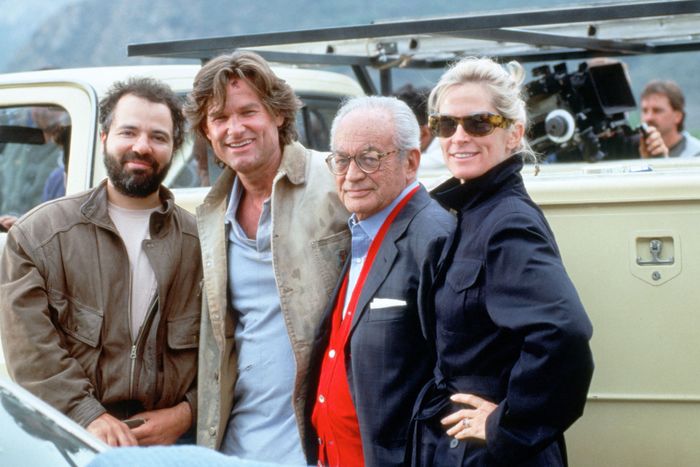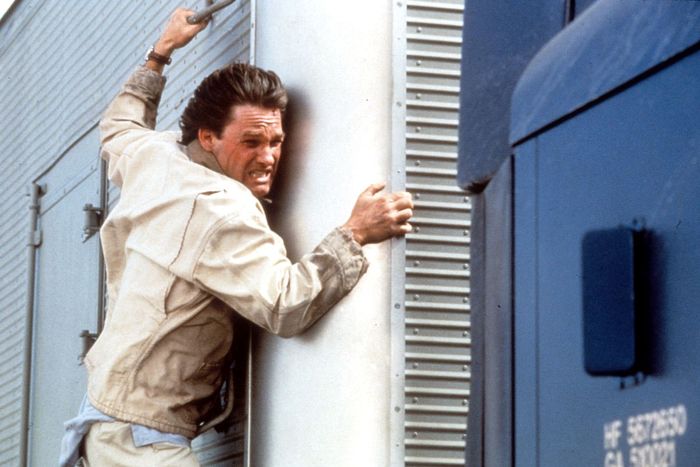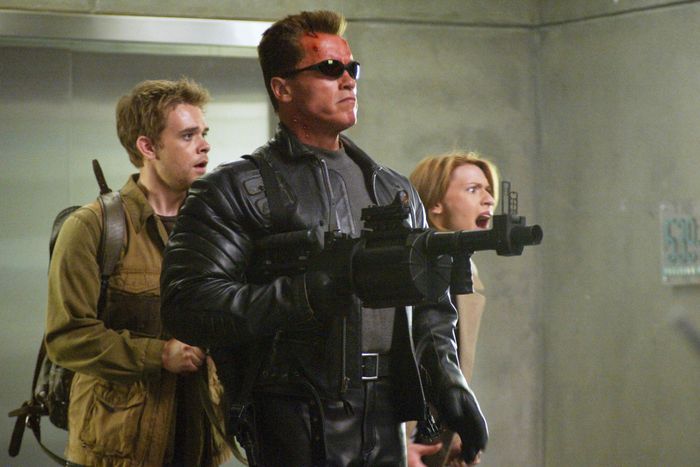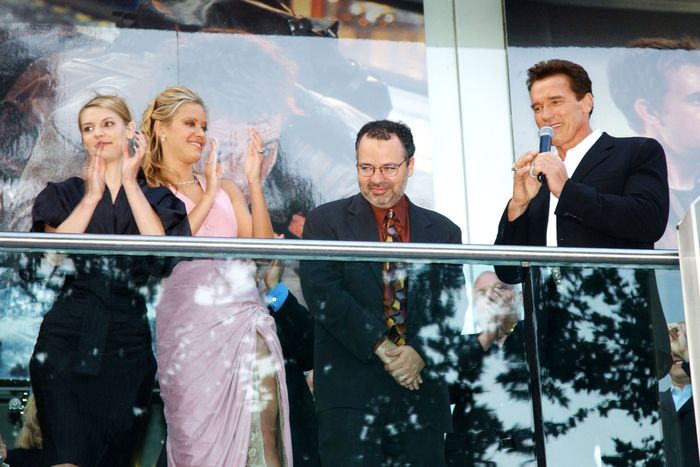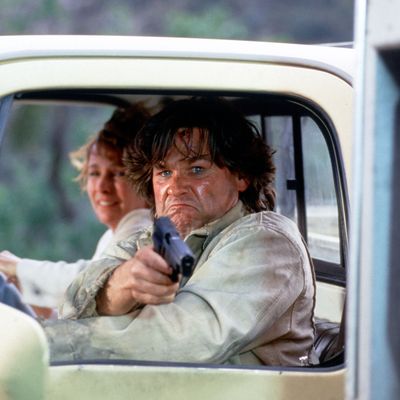
This month marks the long-awaited Blu-ray release of the 1997 hit Breakdown, in which Kurt Russell stars as a man whose wife (Kathleen Quinlan) is mysteriously abducted after their car breaks down in the middle of the desert. One of the great thrillers of the 1990s, the film served as a breakthrough for director Jonathan Mostow, who would follow it up with the spectacular WWII submarine epic U-571 (2000), starring Matthew McConaughey, Bill Paxton, and Harvey Keitel, before vaulting into franchise land with Terminator 3: Rise of the Machines (2003). Although T3’s reputation has eroded somewhat over the years, it’s actually a solid action film, and quite possibly the darkest sequel ever made for any major movie franchise.
After that, Mostow’s output seemed to slow to a crawl. His next feature would be 2009’s financially and critically disappointing Bruce Willis sci-fi film Surrogates, and then a small 2017 hitman flick called The Hunter’s Prayer. But Breakdown reminds us of the dazzling skill with which Mostow puts together action scenes, not to mention his facility with big machines. (Among other things, Breakdown is one of the all-time great truck flicks.) We talked about how Breakdown came to be, the insanity of making T3 when Arnold Schwarzenegger’s political career was taking off, why the director seemed to slow down after that film, and that time he caused an international incident with U-571.
Tell me about the circumstances that led to you making Breakdown.
I had moved out to L.A. after I got out of college. Deep down I dreamed of being a filmmaker but it just didn’t seem like a realistic goal. I’d been a fan of Dallas, which was made by a company called Lorimar. The final credit would come up and say, “Lorimar,” and I thought, This Lorimar, they must have a parking lot. And they must have parking attendants to park the cars of all the big shots that go to this Lorimar. I shall go find this Lorimar and I shall go become a parking-lot attendant there. And that will be my entrée into show business and I will meet people and somehow I will go from there. And that didn’t work out.
If you scratch behind any filmmaker, you will find someone that perhaps should have been a used-car salesman. Because ultimately, what you’re trying to do is get somebody with money to separate from their money. And the pitch is, “Okay. We’re going to make a prototype but we need all the money just for the prototype. But if you don’t like the prototype, you can’t get your money back.” I ultimately succeeded in that. And the second film that I made [Flight of Black Angel], which was only about a million-dollar budget, I ran out of money. Someone introduced me to [producers] Dino and Martha De Laurentiis and I went to their office and showed them 20 minutes of edited footage. The next day they gave me a check to complete the film. That began a relationship.
Right before Breakdown, I had been developing for the De Laurentiises a movie based on a Stephen King short story, set out in the desert, called Trucks. In the ’80s, it had been turned into a movie that Stephen King himself directed, Maximum Overdrive. The soundtrack was wildly successful but the film itself was perceived as a misfire. But Dino and Martha had retained the rights to the underlying short story. When that fell apart, I was desperate to salvage the situation. And the idea for Breakdown just popped out of my head. I wrote it in three weeks. Breakdown has nothing to do with the Stephen King movie, but I think I owe Mr. King probably a debt of gratitude.
Was Kurt Russell your first choice?
Yes. There was a seven-year period [before Breakdown] when I had various projects, but I could never get them to the starting line. I’d been developing The Game, which was ultimately directed by David Fincher and starred Michael Douglas. I’d wanted Kurt to star in that movie. So, when Breakdown came up, he was the guy I wanted. When we got him, I thought, If I don’t screw this up some other way, it’s going to work. Because he’s unparalleled as a film actor and terribly underappreciated for his ability to convey what he’s thinking without a word of dialogue. Through a multitude of little behaviors, subtle cues, you get what he’s thinking.
A lot of people forget. He was in the Mike Nichols film Silkwood, and he co-starred with Meryl Streep and Cher. There’s a wonderful scene in that movie where they’re flying. They’re all in coach, sitting three across. And, as I recall, Kurt is sitting between the two of them and all the dialogue in the scene is between Meryl Streep and Cher. All he can do is follow the conversation. And you watch him. You get exactly what he’s thinking. That’s just an incredible gift — to audiences and to a filmmaker.
He is so perfect, and yet if you described the part to me, I would never think of Kurt Russell.
Breakdown was about a ten-week shoot and after a couple of months, Kurt says to me, “I’ve been coming home every day … I’ve done movies that are physically more demanding than this, with more demanding stunts and bigger action and whatnot. But I’m finding myself coming home every night and I say to Goldie [Hawn], ‘I am in pain. I am in physical pain, and I don’t understand it.’” And he said, “Then, I finally realized it’s this character. I’m playing a character that is just wracked with anxiety, who’s in this constant state of panic the whole movie.” And if you know Kurt, who’s completely non-neurotic, this is the opposite of who he is. My private joke to myself was, “Well, actually he’s playing me in that situation because that’s exactly how I would be, just without all the heroics.”
It’s interesting that so much of this came after you had developed The Game. Because when you think about it, Breakdown is a similar story of a man trapped in a reality that’s been manipulated for him. There are interesting echoes between the two films.
In my mind, it’s the same movie! In the version of The Game that I developed, Michael Douglas’s character was trapped in this paranoid nightmare and he believed that everybody was in on the conspiracy, but at the end, it was just a handful of people who were manipulating things. In the final movie, they changed it so it was hundreds of people involved. And so, in Breakdown, Kurt Russell’s character thinks the whole town is in on this. But in fact, we get right down to just these four criminals, this band of thieves. It’s never stated, but part of the reason that he’s so paranoid is that there’s a real class-warfare subtext going on here. He’s this white-collar guy from the big city, and there’s a part of him that looks down a little bit on these people. It’s a brushstroke, but it’s there, right?
Tell me about working with J.T. Walsh.
J.T. was the definition of the ideal character actor. Sadly, soon after our film came out, he shot one more movie and then unexpectedly died of a heart attack. I helped put together a memorial service for him at the Directors Guild Theatre. Several hundred people showed up. We showed this 30- or 40-minute clip reel on the big screen. Just clips from all these different films, and everyone had the same reaction: Everyone’s jaw was on the floor by the end, because, first of all, his work was so good. But the other thing was, every time he’d come up — whether it’s Good Morning, Vietnam or Tequila Sunrise or The Big Picture — people would say, “Oh, I forgot he’s in this movie.” Because he would subsume himself in that particular character. There was a downside for him personally as an actor: When you’re a movie star, you bring a lot of yourself to each role, and that builds up your career and your audience. But when you literally become part of the woodwork, it’s hard to build that up. So, he didn’t get the recognition he deserved within the Hollywood beltway until actually Breakdown. After Breakdown, his salary shot up. He had struggled for years financially because he never became “a star.”
What was your relationship like with Dino De Laurentiis? I gather he was a real character.
Dino was like a character in a Moss Hart play. He had this fantastic sense of his own over-the-top-ness. This is a man who produced 500 movies. He built movie studios on, I think, three different continents. And he loved movies. Every day, he would be driven from his office in Beverly Hills by his chauffeured Rolls-Royce back to his estate in Beverly Hills. He’d have lunch prepared by his fantastic chef, Gigi, who made the best Italian meals I ever had in my life. And then he’d come back to the office and, in the 100-seat screening room in the first floor of his building, he would watch a movie. Every day.
The thing that I loved about Dino — and I think I said this on the commentary track I did with Kurt Russell for the Blu-ray — is that he had the résumé to be able to sit across from you and say, “No, no. We’re doing it my way,” on any particular issue. He and I would often get into heated arguments about the way to do some particular thing. He loved those. He’d be banging the table. I used to be a high-school debater so I guess I liked the arguing. And the thing would end unresolved. The next day, we’d come back and we’d have the same argument. However, overnight, I would have thought about what he was saying and realized, “Yeah. He’s right about that thing.” And he would have done the same thing. So, we’d have the same argument but we’d switch sides on this thing and then argue with the same intensity. It was a fantastic relationship. He was like a mentor to me.
Breakdown was an unexpected hit. It was No. 1 and got really nice reviews. It opened on a Friday and so that Monday, he called me into the office. And he said, “I made a big mistake. I gave you this big break by financing this movie. I should have signed you to a two-picture deal.” So, he slid a piece of paper across the desk and he said, “I want you to sign this thing, and it obligates you to do your next movie with me.” By this point, I had fancy agents and lawyers who had signed on because they’d seen Breakdown. I called them up and said, “What should I do?” And I had to hold the phone receiver out away from my head because they’re screaming, like, “That’s ridiculous! He can’t do that!” So, I hung up the phone and I signed it, because Dino was absolutely right. I did my next movie U-571 also with Dino and Martha. And again, a great experience.
I remember at the time U-571 came out, there was a controversy about the fact that Hollywood had made an action movie about heroic American sailors capturing an Enigma machine. This was before Michael Apted’s Enigma and The Imitation Game, and it seemed like the U.S. taking credit for one of wartime Britain’s greatest achievements.
Oh, yeah. I got sucked into the middle of that. In fact, here actually, I’ll show you. [Picks up and displays a framed letter from his office wall.] I actually keep this on my wall. This is a letter from the White House, Bill Clinton as president, to a Member of Parliament, trying to explain that it’s fiction and you shouldn’t worry about it.
It is inspired by actual component events. As we were getting underway filming, the British press started running with a story about how the Americans were trying to make this film falsely claiming that we’ve broken the Enigma code, which is a matter of great national pride for the British. I saw that and said, “Oh jeez, we got to do something about this.” I reached out and I found this guy. He was in his 80s at that point, Lieutenant Commander David Balme. He was the lieutenant aboard a British surface ship that had depth-charged a U-boat in 1942. And he had led a boarding party onto this U-boat, which at this point was foundering, to see if they could find anything. He didn’t know what an Enigma machine was. But he found this thing that looked like a typewriter, and thought, “Well, this maybe has some value.” That ultimately is what led to Bletchley Park, which is where the British had all these code-crackers, if you’ve seen The Imitation Game. And this guy was sworn to secrecy. The British government didn’t want it leaking out that we had captured one of their submarines. King George personally gave this guy the highest military honor that any British military person can receive, and it was done in secret. I tracked down this guy, and I said, “I’d like you to come to the set in Malta. You can look at the script, we’ll show you everything, and if you’re offended by it, speak your mind.” And this guy came out, saw everything. He then waited to see the finished film, which we showed him when it was done, and he loved it. And he said, “I have no problem with this.”
But from a public-relations standpoint, you can’t unring that bell. For years when I would go to England, I would get stabbed about it. They even convened a special session of Parliament where the British prime minister, John Major, got up and put forward a motion, I think, deploring the movie or something. It was a public-relations disaster. I remember getting a call one day from a publicist saying, “Hey, will you go on the British equivalent of Good Morning America and debate the British prime minister over this issue,” and I was like, “Sorry! No. That is a no-win situation for us.” Thank God that social media hadn’t kicked in at that point, because I would’ve been canceled five times or more. [Laughs.]
Breakdown, U-571, and T3 all demonstrate an incredible confidence and expertise with machines: cars, trucks, cranes, submarines. How did you achieve that?
To me, if the audience understands where they are in the space, they’re going to appreciate and understand the scene more. When I was a kid, I used to play with toy cars and trucks, and you either had the Matchbox cars, which had a certain scale, or you had your Tonka trucks, which had a completely different scale. Sometimes I’d get together with other kids in the street, and we’d be playing with Matchbox cars and then suddenly they’d bring out the big Tonka truck and start playing with that. And I’d be like, “No, no, you can’t do that!” I literally would leave and go home, because I was like, “No, that’s not okay.” [Laughs.] So, I think I just intrinsically have a sense of self-discipline about the clarity and scale of those action sequences.
I was really impressed with how dark Terminator 3 managed to be. There aren’t a lot of blockbuster action movies that end with actual nuclear armageddon.
What enabled us to do the very dark ending was that Terminator 3 was an independent film. Actually, all but one of my films have been independently financed films. What that means is, yes, it was distributed by a studio — Warner Brothers domestically, Sony in most of the foreign territories — but those studios really weren’t involved in the making of the movie. In fact, only one person at Warner and one person at Sony could have a copy of the script. It had to be kept in a safe, and no one else was allowed to read it. So, they got to read it ahead of time when deciding whether or not they wanted to co-finance the movie. And then, once I was done with the movie, we invited them to come to a screening and we showed the movie, and that was it. From a filmmaker standpoint, to be doing a $200 million movie without the studio nervously looking over your shoulder was amazing. Had that been a typical studio film, we never would have been able to do a dark ending like that.
I also wanted that to be a surprise for the audience. So, we said to Warner Bros. and Sony, “We really want to keep this a secret.” So we scheduled the premiere for just like two nights before. We scheduled it right before the release, and the publicity people were really good about getting all the journalists to have no spoilers, hold the reviews, and everything else. But looking back, I feel like had we teased a little more that there was a surprise coming, it might’ve actually been better for the box office domestically. It may be one of the reasons why the film did better overseas, because by then the cat was out of the bag.
T3 came out the year Schwarzenegger became governor of California. Was his political career at all a thing during the shoot?
Yeah. It was. I joked that we had somebody from every level of elected office visit the set when we were filming. Because Arnold, he’s a born politician. So he would have all these, like, VIPs who were visiting. We had everybody from the local city councilmen to the mayor. We had governors of other states come. At one point Bill Clinton came to set, with the Secret Service and everything. We had built several city blocks of L.A. out in this industrial park, and we were in the process of demolishing them. He’d just got out of office, and he’s looking at this thing, and he’s going, “Wow. This is amazing.” Like on a whole other level of amazing of what he had seen. And I thought, “Okay, if he thinks that’s amazing, I think it’s amazing.” So that was a great, great moment.
Did you remind Bill Clinton of the international incident you caused with U-571?
If you’re meeting a president, I think the last thing you want to do is, “Hey, you remember the problem I caused?”
Did you ever talk to James Cameron about T3? What did he think?
I do remember reading that he said something complimentary about it soon after it came out. We had a couple of phone conversations subsequent to that because he’d asked me if I wanted to direct a movie that he was producing. I can’t even remember exactly what film that was. I think it was two different films, actually. We must’ve talked about T3, but I don’t remember the specifics. I’m embarrassed to say that, because you’d think I should remember this. But also, if somebody made a sequel to something that was my baby, I don’t know if I could be as generous he was.
The fact that he was talking to you about directing something he was producing suggests that he didn’t think you’d completely ruined it, I suppose.
And by the way, who better than another director to understand? All directors, I find, are incredibly sympathetic to other directors. We all understand you have to walk in those shoes to understand how challenging it is to make any movie and have it turn out well, and how many things are constantly threatening to derail what you’re trying to do.
The problem in Terminator 3 is that Terminator 2 was such a seminal movie. It was going to be impossible to blow people away because T2 was the first time a lot of people saw digital effects. The liquid-metal man, no one had ever seen that before. That and Jurassic Park, those are two movies that probably most have blown people away from seeing them in the theater. I knew that we wouldn’t be able to achieve that. I also knew there was going to be a lot of skepticism. Why do you even need a third Terminator? I felt that I had to disarm those people. So that’s why we made the choice to use humor, which is front-loaded earlier in the movie. Some of it’s too shticky, some of it has not aged well with time, I’ll be the first to confess. But if you went to the theater at the time, it worked with the audience.
Was the response to T3 in any way a problem for you? Afterwards, you didn’t work for a while and since then you’ve only made two films.
No. It did really well overseas. I don’t think it quite hit the marks that maybe they were hoping for domestically. But I don’t think that film hurt me, because in the wake of it, I had deals in a bunch of studios for other films. But I got a little spoiled because, as I said, almost all the films I’ve made have been independently produced. I would say, “Okay, here’s the film I want to make.” And that would always work out. And the film would do well enough that I could sit back and not feel, “Oh, my God. I’ve got to grab a job and jump into something else.”
At the same time, I was starting a family. My oldest child was born the week before Breakdown came out. In fact, he was born the night of our screening. So, I made a deliberate choice. I figured there’s always going to be movies but my kids are going to be young only once. I wanted to be more present for that so I didn’t keep a heavy foot on my career accelerator. Where that becomes problematic is when you have films that don’t work out. I had two films where I was set to go. I’d written them, they were being green-lit, ready to go … and the studio head was fired. It was shocking. It had nothing to do with me or my particular project, but often when the studio head is fired, a new one comes in and says, “Forget the stuff that that person was making. We’re now doing different things.” And I was never somebody with a lot of projects in development, so that hurt me. It’d take several years to try to get something else going.
Also, I’ve been too picky. When I go to work, I have to feel like, “I think this could be great.” Now, they’re not always great. That’s the awful thing about this profession. In other jobs, you can go to work every day and come home and think, I’m pretty good at what I do. I won this case or whatever. When you’re a filmmaker, you can come home every day going, “The thing I’m making is great.” But then, it comes out, and the world reflects back to you like, “No, it isn’t. In fact, it’s quite bad.” And this happens on such a public level — that kind of destroys you. That, I think, made me gun-shy about going to work unless I really felt I had something that I was excited about.
Breakdown to me feels like the kind of tight, solid, incredibly suspenseful thriller that just doesn’t really get made anymore. Why is that?
There’s two reasons. Number one, specifically with a movie like Breakdown, I don’t think it gets made because nowadays, in film financing, an important piece of the budget — usually sometimes around 20 percent, 25 percent, sometimes even 30 percent — comes from a tax subsidy from the place where you make the film. Breakdown was filmed in five states. It was really like a traveling circus. You just couldn’t do it today.
The second reason goes back to why the film was hard to make in the first place. Every studio passed on Breakdown. They passed on it when it was a script. They passed on it when we had Kurt Russell attached. When you talk about films that have a lot of suspense in them — the executives who make these decisions, every weekend, they have to read a huge pile of scripts. (Back in the day when scripts were printed, they’d literally bring home a box of scripts.) They have to read them and be ready for the Monday morning meeting to discuss what everybody read over the weekend and if there’s anything worth pursuing. If you have to read that many scripts, you’re flipping through the pages, trying to read a script for a two-hour movie in 20 minutes. And suspense exists not in the lines, but between the lines. You almost have to imbibe these scripts in real time. That’s just not feasible if your job is to analyze 20 scripts on a weekend. So a lot of these scripts just slip by people. With Breakdown, studio executives who read it were like, “I dunno, it’s a guy running around the desert, why should I care?”
Long ago, I was the first director attached to Se7en. I had found the script as a spec script, unsold. Nobody knew about it. I tried to get that going, and people would go, “It’s a cop buddy movie. They’re out of favor right now.” I’m like, “It’s not a cop buddy movie! It’s an incredibly suspenseful story!” But again, when you’re going real fast, you don’t see it.
This interview has been condensed and edited for clarity.



